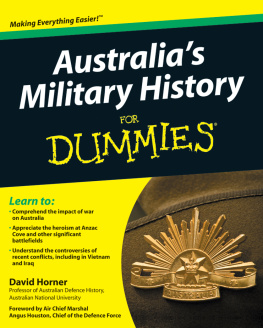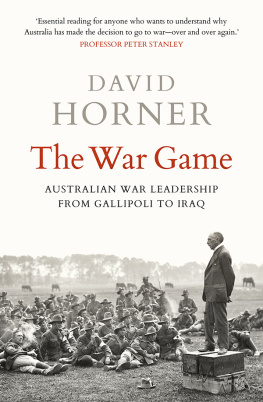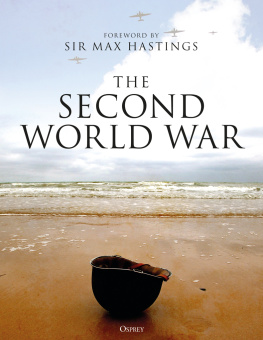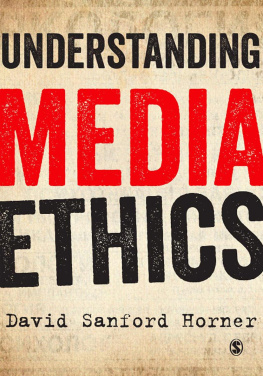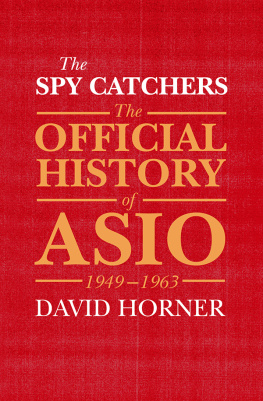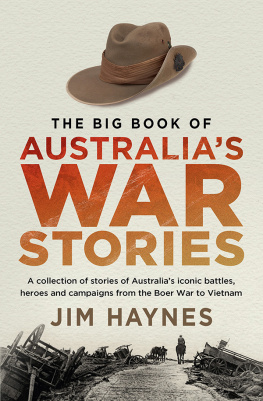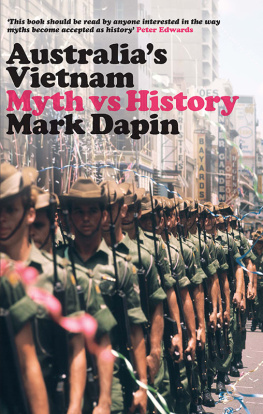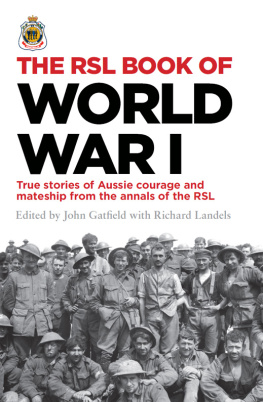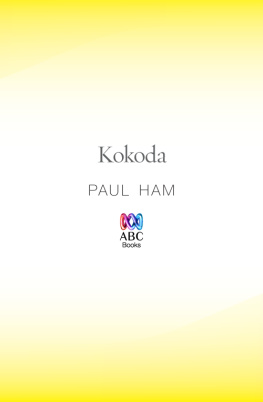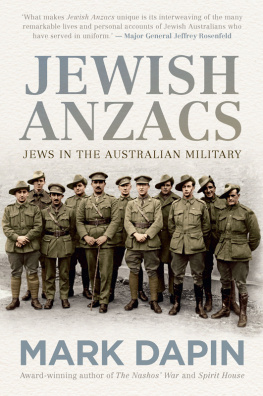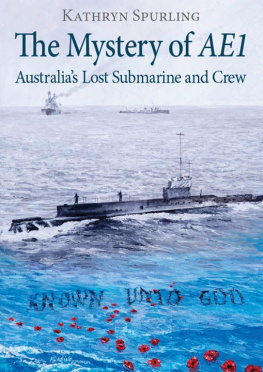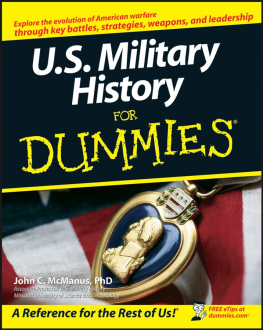Australias Military History Dummies
by David Horner

Australias Military History For Dummies
Published by
Wiley Publishing Australia Pty Ltd
42 McDougall Street
Milton, Qld 4064
www.dummies.com
Copyright 2010 Wiley Publishing Australia Pty Ltd
The moral rights of the author have been asserted.
National Library of Australia Cataloguing-in-Publication data:
Author: Horner, D. M. (David Murray), 1948.
Title: Australias Military History For Dummies/ David Horner.
ISBN: 978 1 74216 983 5 (pbk.)
Notes: Includes index.
Subjects: Military history.
Australia Armed Forces History.
Australia Military policy History.
Australia History, Military.
Dewey Number: 355.00994
All rights reserved. No part of this book, including interior design, cover design and icons, may be reproduced or transmitted in any form, by any means (electronic, photocopying, recording or otherwise) without the prior written permission of the Publisher. Requests to the Publisher for permission should be addressed to the Contracts & Licensing section of John Wiley & Sons Australia, Ltd, 42 McDougall Street, Milton, Qld 4064, or email auspermissions@wiley.com .
Cover image: Sally-Anne Kerr/iStock
Typeset by diacriTech, Chennai, India
Printed in China by
Printplus Limited
10 9 8 7 6 5 4 3 2 1
Limit of Liability/Disclaimer of Warranty: THE PUBLISHER AND THE AUTHOR MAKE NO REPRESENTATIONS OR WARRANTIES WITH RESPECT TO THE ACCURACY OR COMPLETENESS OF THE CONTENTS OF THIS WORK AND SPECIFICALLY DISCLAIM ALL WARRANTIES, INCLUDING WITHOUT LIMITATION, WARRANTIES OF FITNESS FOR A PARTICULAR PURPOSE. NO WARRANTY MAY BE CREATED OR EXTENDED BY SALES OR PROMOTIONAL MATERIALS. THE ADVICE AND STRATEGIES CONTAINED HEREIN MAY NOT BE SUITABLE FOR EVERY SITUATION. THIS WORK IS SOLD WITH THE UNDERSTANDING THAT THE PUBLISHER IS NOT ENGAGED IN RENDERING LEGAL, ACCOUNTING, OR OTHER PROFESSIONAL SERVICES. IF PROFESSIONAL ASSISTANCE IS REQUIRED, THE SERVICES OF A COMPETENT PROFESSIONAL PERSON SHOULD BE SOUGHT. NEITHER THE PUBLISHER NOR THE AUTHOR SHALL BE LIABLE FOR DAMAGES ARISING HEREFROM. THE FACT THAT AN ORGANISATION OR WEB SITE IS REFERRED TO IN THIS WORK AS A CITATION AND/OR A POTENTIAL SOURCE OF FURTHER INFORMATION DOES NOT MEAN THAT THE AUTHOR OR THE PUBLISHER ENDORSES THE INFORMATION THE ORGANISATION OR WEB SITE MAY PROVIDE OR RECOMMENDATIONS IT MAY MAKE. FURTHER, READERS SHOULD BE AWARE THAT INTERNET WEB SITES LISTED IN THIS WORK MAY HAVE CHANGED OR DISAPPEARED BETWEEN WHEN THIS WORK WAS WRITTEN AND WHEN IT IS READ.
Trademarks: Wiley, the Wiley logo, For Dummies, the Dummies Man logo, A Reference for the Rest of Us!, The Dummies Way, Making Everything Easier, dummies.com and related trade dress are trademarks or registered trademarks of John Wiley & Sons, Inc. and/or its affiliates in the United States and other countries, and may not be used without written permission. All other trademarks are the property of their respective owners. Wiley Publishing Australia Pty Ltd is not associated with any product or vendor mentioned in this book.
About the Author
David Horner is Professor of Australian Defence History in the Strategic and Defence Studies Centre at the Australian National University. A graduate of the Royal Military College, Duntroon, the Australian Armys Command and Staff College, the University of New South Wales and the Australian National University, he served as an infantry platoon commander in Vietnam in 1971 and had various regimental and staff appointments until he retired from the Army as a lieutenant colonel in 1990.
He is the author or editor of 28 books on Australian military history, strategy and defence, including Crisis of Command (1978), High Command (1982), SAS: Phantoms of the Jungle (1989), Inside the War Cabinet (1996), Blamey: The Commander-in-Chief (1998), Defence Supremo (2000), Making the Australian Defence Force (2001) and Strategic Command, General Sir John Wilton and Australias Asian Wars (2005). He is the editor of the Australian Armys military history series and has been the historical consultant for various television programs. As an Army Reserve colonel, from 1998 to 2002 he was the first Head of the Australian Armys Land Warfare Studies Centre.
In 2004 Professor Horner was appointed the Official Historian of Australian Peacekeeping, Humanitarian and Post-Cold War Operations, and in 2009 was made Member of the Order of Australia for service to military history.
He lives in Canberra, with his wife, Sigrid.
Dedication
To the men and women of the Australian Defence Force, who serve the nation at home and overseas with professionalism, dedication and sacrifice.
Authors Acknowledgements
Publishers Acknowledgements
Were proud of this book; please send us your comments through our online registration form located at http://dummies.custhelp.com.
Some of the people who helped bring this book to market include the following:
Acquisitions, Editorial and Media Development
Project Editor: Catherine Spedding
Acquisitions Editor: Bronwyn Duhigg
Editorial Manager: Hannah Bennett
Production
Graphics: Wiley Art Studio
Cartoons: Glenn Lumsden
Proofreader: Charlotte Duff
Indexer: Karen Gillen
The author and publisher would like to thank the following copyright holders, organisations and individuals for their permission to reproduce copyright material in this book:
Cartographer: GIS Services, College of Asia and the Pacific, The Australian National University
Every effort has been made to trace the ownership of copyright material. Information that will enable the publisher to rectify any error or omission in subsequent editions will be welcome. In such cases, please contact the Permissions Section of John Wiley & Sons Australia, Ltd.
I t has been very pleasing over the past decade to see greater interest in Australian military history. During this time, attendance of Australians at Anzac Day services, Remembrance Day events, and individual war and battle commemorations has risen. Additionally, increasing numbers of books, television programs and movies have chronicled some of our most important and iconic battles. I consider this to be vitally important, because sadly, as the years go by, we are losing our direct link to our past. Already gone are our Veterans from the First World War and the number of Second World War, Korea and Vietnam Veterans diminishes every year. As the experience of these wars continues to recede, it is essential that we remember and honour these major aspects of our military history which saw the tragic loss of more than 100,000 Australian men and women. This is a debt we owe to all those who have sacrificed their life for our nation.
Additionally, as the Chief of the Defence Force, I am very happy that our increased commitments over the past decade have meant that we are currently enjoying a rejuvenated interest in the Australian Defence Force (ADF), our people and our operations. I firmly believe that Australias armed forces are more professional, more capable and more ready to respond to unexpected demands than at any time in our history.
In the first decade of the 21st century the ADF has once again been at war. Following the 2001 terrorist attacks in New York and Washington, Australian Special Forces took part in a 12-month deployment to Afghanistan in order to deny the country as a safe haven for terrorists. In support of this operation, other units, including ships and aircraft, went to nearby areas in the Persian Gulf. In 2005, ADF men and women went back to Afghanistan and since then our people have made contributions to international campaigns against terrorism, countering piracy in the Gulf of Aden and maritime security in the Middle East Area of Operations. Additionally, in 2003, Australian forces also took part in one of the most complex operations ever undertaken by the ADF Operation CATALYST. During the course of this six-year operation, thousands of Australian servicemen and women were instrumental in developing a secure and stable Iraq.

